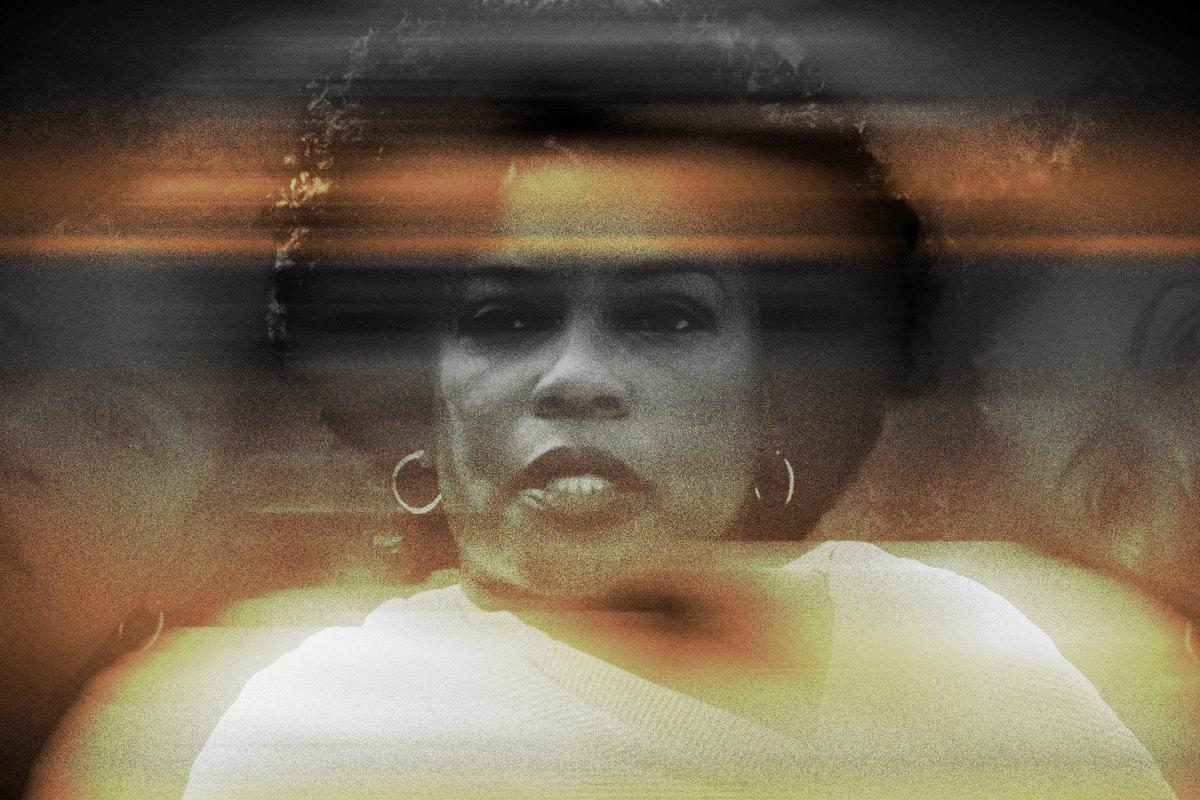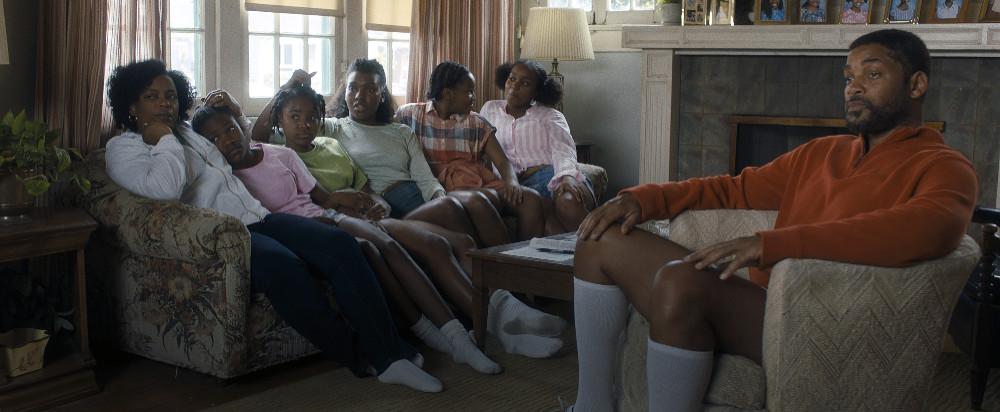Make the Case: Aunjanue Ellis’s ‘King Richard’ Performance Is Grand Slam—and Oscar—Worthy
Ellis, who shines with righteous restraint as Venus and Serena Williams’s mother Oracene in the tennis biopic, speaks with The Ringer ahead of the Academy Awards about hot vans, linked arms, and her audio inspiration for her nominated role
At one point in the tennis biopic King Richard, six characters sit wedged onto one family sofa, bodies angled as if they’re posing for a prom photo or performing in a choir. Their proximity is easy and radiant: You can practically feel the body heat, the fidgeting, the feet falling asleep. Most of them are sisters, accustomed to sharing space, and their knees and shoulders and craned necks gravitate the same way, toward their mother Oracene “Brandy” Williams, played with smooth and cooling steeliness by Aunjanue Ellis. Stationed at one end of the couch, Oracene cradles her youngest daughter Serena Williams’s weary head in one hand and holds up her own exhausted chin with the other.
Across the coffee table in the family’s Compton, California, home, patriarch Richard Williams sits alone and unencumbered in his own chair, asking everyone to watch the movie Cinderella as a convoluted lesson in humility. It is Richard for whom King Richard is named, and the film revolves around his dogged and unorthodox management of his prodigiously talented daughters Venus and Serena in the years before they turned pro. Played by Will Smith, Richard is enterprising and outlandish, a man who pushes around a grocery cart full of tennis balls and devised a 70-something-page document outlining the plan for his children’s athletic success before they were born.

But if he is the movie’s axis, Oracene is its Atlas, bearing the film’s world on her shoulders. Sometimes this takes the form of smooshing in with her five daughters on a sofa, or braiding their hair before a big tennis match, or serving as their lower-profile (but still high-intensity) coach. Sometimes it means taking extra nursing shifts, or knocking on a despised neighbor’s door, or teaching her girls about Sojourner Truth.
Often it means choosing her words carefully when she calls her (then-) husband out on his bullshit: “My faith dictates that I stand by your side,” Oracene tells Richard at one point, “but don’t mistake my silence for agreement. You do that again, and I won’t be quiet.” In another scene, she stands in the kitchen slathering peanut butter on bread while slicing and dicing apart her husband’s self-mythologies. “You’re not the only dreamer in this family,” she says, punctuating her words with her kitchen knife. “There would be no dream if it wasn’t for me. I carried those girls, inside me and on my back. And I carried you too.”
King Richard is nominated for six Oscars, including Best Picture, Best Actor, and Best Screenplay. In many ways it’s Ellis, who is nominated for Best Actress in a Supporting Role, who pulled all those parts together, quietly elevating the whole. Righteous and restrained, her character has a sharp tongue, a steady eye, and the strength of her convictions. And like Oracene, Ellis enhances and enables the personalities around her with cool command, executing on everyone’s ambitious goals. Over the years, their mother’s support helped Venus and Serena take home many a tennis trophy. Now, with a nuanced portrayal of that effort, Ellis has earned some hardware of her own.
Like most people, Ellis long associated Oracene Price with sidelines and sunglasses. Price, now 69, has been such a courtside fixture at both of her daughters’ matches over the years—and there have been so very many matches since Venus’s pro debut in 1994 and Serena’s in 1995—that it’s hard not to hear her name and immediately visualize her placid, inscrutable stare in the midst of some lively Grand Slam crowd. (Price once told a reporter at an Australian Open party that she was kinda bored of all her years of tennis travel: “It used to be I looked forward to getting away from L.A., but now it’s getting dull, to be perfectly honest.” she said. “It’s the same old, same old, keep on going over and over and over again.” And that was more than a decade ago!)
But King Richard is set before all of that, in the first half of the ’90s in Compton and then Boca Raton, Florida, and so in preparing for her role Ellis relied less on her visuals of Price in the present day and more on a set of audio recordings of Price—whom Ellis refers to as “Ms. Oracene”—reflecting on her past in interviews with King Richard writers and producers. Speaking by Zoom last week, Ellis recalls living in a rental house “in one of the hills” in California preparing for King Richard rehearsals in early 2020, before the production was put on pandemic hiatus for seven months. It was there that she started playing the tapes.
“And I remember moving around in the house and hearing her voice and hearing her talk about how she was an athlete as a kid and how she played baseball,” Ellis says, “and she was really, really good at it, to the point that she would annoy people because she was so good at it. And I think that was probably the most resonant thing: the biggest directive I had, if that makes sense, about how I saw her. Because one, what is it like to be an athlete as a kid and be really, really good—but not have any avenues when you’re older to express that? And then, you give birth to tennis champions? What does that look like? Because that doesn’t leave you, you know?”
Ellis was also surprised by how big of a coaching role Price had played in the girls’ athletic development growing up, a detail that was both a burden and a boon. On the one hand, Ellis neither loved nor—to hear her tell it—thrived in the several-day-per-week tennis lessons she took to give her some on-court fluency. On the other hand, though, learning more about Price’s overlooked role in the Williams’ eventual 30 singles and 14 doubles Grand Slams made Ellis feel as though she was on a personal crusade to get Price’s story told.
“I just feel that we still live in a time where these stories about women have to go through the gates that are guarded by men, unfortunately,” Ellis says. (King Richard is written and directed by men; three of Price’s daughters—Venus, Serena, and Isha—have executive producer credits, and a fourth, Lyndrea, worked in the costume department.) “And because of that, there’s so little that we know about ourselves, and particularly Black women. And so it became, really, honestly kind of this political act for me.” She saw the role as a “rallying cry,” she says, but came to understand that playing Miss Oracene in King Richard required finding the power of forbearance, too.
With so much on her heart, Ellis went into production ready “to tear down the place,” she says, but “Rei[naldo Marcus Green], my director, would just come up and whisper in my ear: ‘Remember, you’re Oracene? Remember her poise?’” Oracene is quick to read a room but deliberately slow to raise her voice, and so when she does, it resonates. In one panel interview about the film, Will Smith talked about what it was like to meet Oracene Price in real life. “She’s quiet 90 percent of the time,” he said. “And when she talks, it’s a sledgehammer on the nail, and then she goes back to chilling again—watching, observing.”
Richard Williams was forever the opposite: Both his renown and his infamy were functions of never staying quiet. A May 1999 Sports Illustrated feature on the Williams family was headlined “Who’s Your Daddy?” Later that fall, after Serena won the U.S. Open, the SI headline was: “Father Knew Best.” One of the pieces described Price as “the family’s quiet authority … balanc[ing] Richard’s bombast with her strong faith” and noted that she had told him, two years earlier, that he was in the wrong when he called tennis player Irina Spirlea a “big tall white turkey” after she collided with Venus during a changeover.
“He didn’t say anything,” Price remarked to the magazine, “but he hears me.”
Two of King Richard’s strongest scenes between Ellis and Smith examined what that type of exchange might have looked like. The most critically acclaimed is the one that takes place in the kitchen (though it wasn’t originally supposed to). It is cold and cathartic, with Ellis’s tone as edged as the knife in her hand as she talks about infidelity and being a quitter. And yet it’s kind of funny, too: All movie long, one of Richard’s most stubborn bits of tennis doctrine is his ongoing insistence, contra the advice of multiple coaches, that his girls need to point their hips forward and open their stance. “That open stance?” Oracene says, “You got that from me! I fixed Serena’s serve because you messed that up!” In writer Zach Baylin’s screenplay, the scene ends with this outro: Richard, laid low. Oracene standing by his side.
The other scene unfolds in the family’s VW bus-van. (According to Vanity Fair, one sister’s note to the King Richard team when they first joined the film was that it wasn’t accurate to have the VW be so dusty: “Daddy washed the van every week.”) Venus and Serena have just won gold and silver trophies at a tennis tournament, and yet Richard, annoyed that all the girls are “bragging” about this now-past success, wants to leave them on the side of the road to walk 3 miles home. “When these matches is over, I don’t wanna hear nothing about no tennis,” he says to a visibly aghast Oracene. “They can talk about Kingdom Hall, they can talk about dinosaurs, they can talk about space, but I don’t wanna hear nothing about no tennis.” His wife needs only one disbelieving word to speak volumes.
“ … Space?!” she says.
Ellis’s delivery of that word is a perfect bite-sized bit of marital discord as well as a welcome get-a-load-of-this-guy release valve for the King Richard audience. “That’s one of my favorite scenes in the film,” Ellis says, “because it was like—it was all of us together, in that hot van, in South Los Angeles, and he was bein’ an asshole! So I didn’t have much acting to do. I was just responding to Richard, through the voice of Will, and the behavior of Will.” The next scene is the one in which the whole family is made to watch Cinderella, moving from that hot van to that packed couch.
“It was so important to me to show their intimacy,” Ellis says, talking about the many moments of physical closeness in King Richard between her and the girls, and between the girls and one another. “That’s the proof of their bond, and that’s who they are in real life.” A few weeks ago, at the SAG Awards, she glimpsed a representative moment between two real-life sisters.
“Venus had on, of course, uncomfortable shoes, like every other woman in that room that night,” Ellis says. “And when she was walking out, she was walking next to her sister, Isha, and she put her arm through Isha’s arm.” Ellis starts to choke up at the retelling—not because the gesture was exceptional, but because it wasn’t. “You know, her sister was just holding her arm as they walked,” she says. “It was just such a natural thing. That’s what they do.” Her story reminded me of a line in that 1999 SI feature: “[Venus] and Serena lean together and rush off, arms, hips, sides bumping in a giggly tangle.”
The story of the Williams sisters is about tennis, of course, but it’s also always been about the giggly tangle of family and legacy and love, about the way limbs intertwine like roots and heads rely upon necks. Speaking to Vanity Fair, screenwriter Baylin said that in his discussions with Venus and Serena and their sisters, “the girls talk about Richard as being the mastermind carnival barker of this plan, but that it fell on Oracene to be the backbone of the family.” Some of the best scenes in the movie, he said, “are the ones where Oracene is really standing her ground against Richard.”
Richard may be famously unyielding, but Ellis’s portrayal of Oracene shows what it looks like to hold firm. “Richard, you think I’m staying here because of you?” Oracene asks in the kitchen in King Richard, foreshadowing the pair’s 2002 divorce. “I stay here because of my girls.” As viewers, we know she is still here, because we’ve always seen her up there—in the stands, match after match, decade after decade, shrouded in sunglasses.
In a conversation with Variety, the real Oracene Price said that she had been hesitant to see the film for a while. Ellis had access to her interview tapes, but the two spoke only once by phone before filming started. “At first I wasn’t going to look at it,” Price said of King Richard, “because I don’t want to see me.” But then she received a positive review from a trusted source about Ellis’s performance. “My sister called me, and she told me, ‘Umm, that was you,’” Price told Variety. “Everyone that knows me said: ‘That was you.’ Sometimes we don’t see ourselves as we are.”
Ellis has gotten other rave reviews for her work, and not just in the form of her Oscar nomination. Her costar, Smith, told The New York Times that “I want Aunjanue to get her flowers,” and in another interview described how she represented her subject so well: “There’s a really unique strength that Aunjanue was able to capture,” he said. “There’s like, a foundational power that just gets set in the scene that everything and everyone else springs off of.”
Ellis’s 9-year-old niece, Ellis says, liked King Richard so much that after watching it once, she set up an iPad near the bath so she could immediately watch it again. Which means she would have seen some of her aunt’s best work almost back-to-back: a quiet, soulful scene near the film’s conclusion in which Oracene puts beads in Venus’s hair, and one of Ellis’s very first lines in the movie, in which she hints at so, so much to come. “Keep turning those hips,” she shouts at her daughters, “if you want to get power.” When she speaks, people listen.

